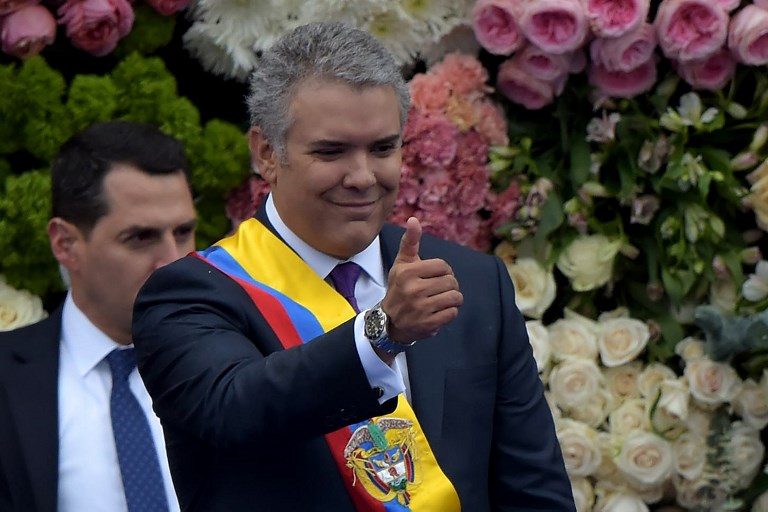
by Hector Velasco / Rodrigo Almonacid
Agence France-Presse
BOGOTA, Colombia (AFP) — Colombia’s new President Ivan Duque took office Tuesday, with no shortage of tough issues to tackle, from heightened tensions with neighboring Venezuela to the lingering difficulties of peace-building with the nation’s rebel groups.
The right-wing Duque, who is just 42 years old, succeeds Juan Manuel Santos — and could work to undo the deal his predecessor reached with leftist FARC guerrillas to end a half-century of conflict.
Wearing a sash in the country’s national colors, Duque took the oath of office in Bolivar Square in historic Bogota in the presence of several regional leaders including Mexico’s Enrique Pena Nieto and Ecuador’s Lenin Moreno.
In his inaugural address, he said he would take steps to fix “structural flaws” in the deal with the Revolutionary Armed Forces of Colombia (FARC), without offering concrete details.
“We will deploy corrective measures to ensure that the victims get the truth, proportional justice, reparations — and no repetitions” of the past, said Duque, a lawyer by training and a former senator.
Duque said he would also take a tougher tack in talks with the country’s last active rebel group, the Marxist ELN, to ensure that a “credible process” is put in place so that that the group ceases all criminal activity within a set time limit.
Colombia’s political left, defeated in June elections, protested as Duque took office, demanding justice for the more than 330 rights activists murdered since the December 2016 peace accord with the FARC.
Tense ties with Caracas
Observers agree that Duque’s success will depend in large part on his connection to popular former president Alvaro Uribe (2002-2010), who handpicked the political novice to help the right — which opposed the FARC deal — regain power.
“His mentor’s situation and relations with Venezuela are the keys” to Duque’s presidency, political scientist Diana Avellaneda from Javeriana University told AFP.
Relations with Caracas took a dive over the weekend when Venezuela President Nicolas Maduro claimed to have been the victim of an “assassination” attempt — and put the blame on Santos, “ultra right-wing” domestic opponents and the US.
Bogota called the accusation “absurd.”
Duque looks set to stand up to Colombia’s neighbor to the east, demanding “free elections” following a May poll that saw Maduro re-elected, which was boycotted by Venezuela’s opposition.
He hinted at a tough line against Maduro, saying Colombia “will reject any sort of dictatorship on the continent.”
The neighbors share a 2,200-kilometer (1,400 miles) long border that is hard to police.
Bogota has accused Caracas of harboring Marxist rebels, while hundreds of thousands of Venezuelans have crossed the border to escape food and medicine shortages, failing public services and hyperinflation in their homeland.
If Duque “starts answering everything Maduro says… he will add fuel to the propaganda and political fire to keep ratcheting up the tension,” said international relations expert Jairo Velasquez.
The analyst added that the new Colombian leader could become Venezuela’s “enemy, real or imagined.”
Peace with rebels? Not so fast
At home, Duque’s firebrand rhetoric has increased tension and rocked already fragile relations with rebels, both former and current.
He has long criticized the FARC deal as being too lenient in allowing former rebels accused of atrocities to serve as lawmakers.
Ending 50 years of conflict that has cost the lives of 260,000 people and left more than seven million displaced is no easy undertaking.
But Duque — with Uribe’s backing — has made it clear he thinks the deal is deeply flawed.
Meanwhile, Santos — who won a Nobel Peace Prize for his work on the FARC deal — admitted defeat in his bid to negotiate a ceasefire with the ELN, despite making “significant progress.”
Duque made it clear that further progress would not come easy.
Political wrangling at home
While his tough stance on peace may give Duque headaches upon taking office, he could also suffer from the rug supporting his political ambitions being wrenched out from under him.
As the hand-picked choice of Uribe, he enjoys considerable support from the powerful Democratic Center party his mentor launched.
But the 66-year-old Uribe, now a senator, is accused of witness interference and faces a Supreme Court investigation, and an uncertain political future.
At least Duque can call on strong regional ties amidst a recent upsurge in the fortunes of the political right on the continent, notably in Argentina, Chile and Peru. Brazil may follow suit in October.
But in addition to woes with Venezuela to the east, all is not serene on Colombia’s southern border, where Ecuador has been angered over the drug-trafficking violence spilling across its frontier.
In Colombia, some 209,000 hectares (516,500 acres) of land are used to grow coca, the principal ingredient used to manufacture cocaine. Colombia is the largest cocaine producer in the world.







